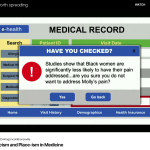I remember when I learn that language evolves. The year was 2009, and “unfriend” was added to the OED. I was furious. Several friends agreed with me, and we snipped about the destruction of the English language, like a couple of old biddies who just happened to be in our early 20s. Yet within a year I was using the word without thinking much of it. My vitriol had passed.
I was offended by a change in language that meant nothing to me. But more importantly, I got over it. Luckily my anger hurt no one, because adding “unfriend” to the English language wasn’t a change intended to remove bigotry or racism. I now realize I was lucky to have that experience. There are far more harmful words in the language I think of as “normal” which need to change.
Of course, language has always evolved. We no longer say “see you on the morrow” or “enjoy your victuals”. In fact, Word Counter estimates that the OED contains over 47,000 obsolete words. So why do we hang onto old, racist words?
We Form Attachments to Language
My experience with “unfriend” has made me aware of how attached I (and others) get to words that mean nothing to us. And yet there are words we say that mean nothing to us but are harmful to others.
Over the years I’ve learned that terms and phrases like “gypped” or “sell down the river” are racist and offensive. They’re words I heard so frequently growing up that I didn’t recognize their etymology, and it was initially tough to catch myself and stop myself from using them. But there are so many other phrases I can use, and I’ve adapted.

Personally, I’m shocked when someone refers to being “Jewed down”. That’s highly offensive to me. So yeah, I get it. I understand that people don’t think about the words they’re used to hearing. And I understand that change is necessary. I can both see how it’s difficult to retrain your brain, and why we need to do it.
I’ve heard two arguments against changing language:
- “It’s just a word. It doesn’t mean anything.”
I interpret this argument to mean “I wasn’t trying to offend anyone, and I’m embarrassed that it did.” That’s totally fair! But if the word doesn’t mean nothing to you, why do you need to use it? It does mean something to someone else. And since you didn’t want to offend anyone, you can make the change. - “We can’t just keep removing words. Where does it end?”
I know this feeling. It’s a reaction to change, which (at least for me!) is scary. But language evolves naturally. We don’t need to eradicate all of human language, but we can treat each situation individually, and stop using words when we hear that there’s a problem.
Language Evolves, and That’s a Good Thing
Language is a reflection of our history. We use words and phrases that remind us of our parents, our grandparents, our favorite teachers. But as much as I loved my grandfather, “use your looks, a pretty girl can sell anything” is not something I want my nieces to hear. It’s not a value I want to pass along.
So yes, white people, I hear you. Changing our language is hard. But language evolves. It always has, and it always will. Let’s evolve it consciously, in an anti-racist way.


